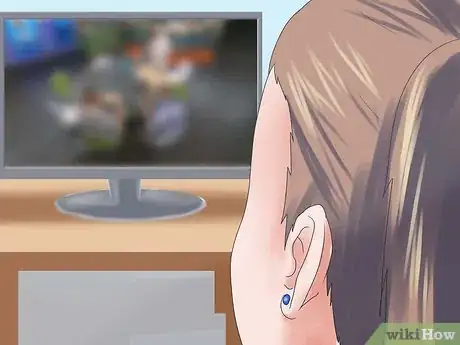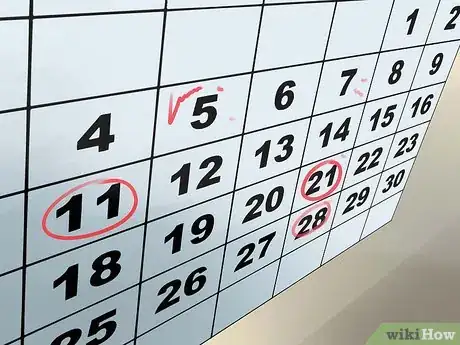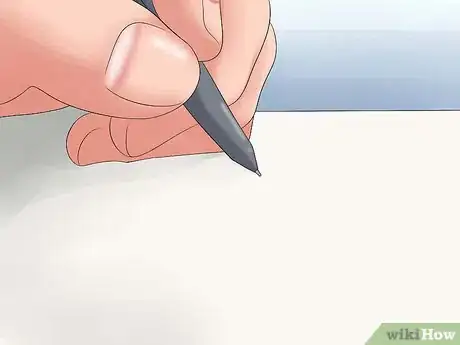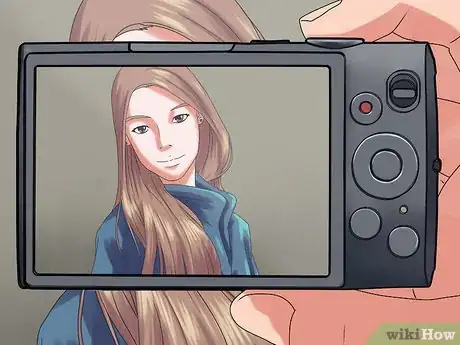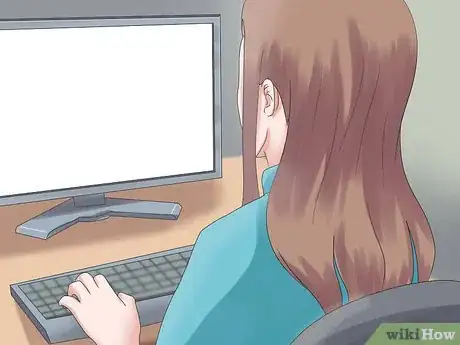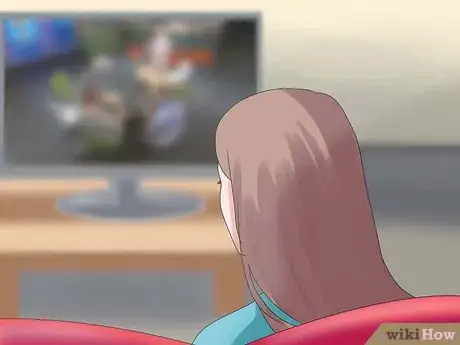This article was co-authored by Martin Bentsen. Martin Bentsen is a New York City-based Acting Coach and Headshot Photographer. Focusing on developing an actor's ability to book more work, Martin advises clients on professional headshots, demo reels, biographies, websites, and how to connect with talent agents. He has taught actor marketing strategies at New York University, The Actor's Green Room, and Actor's Connection. He has taken over 6,000 headshots for City Headshots and teaches actors via classes, emails, and one-on-one consultations. Martin holds a BFA in Film and Television from New York University.
This article has been viewed 66,696 times.
TV is so widespread nowadays it seems like anyone can get on it. Do you hoard things? You can get on TV. Do you want to live with a group of strangers? You can get on TV. Are you willing to stand in the back of a crowd and get taped cheering? You can get on TV. It's only when you hit the big leagues that it seems to be difficult. Whatever your route, with a little perseverance and a fantastic audition, it's possible.
Steps
Getting on a Sitcom or Drama
-
1Build your theatre resume and get headshots done. In order to walk into any audition big or small, you need a resume and headshots.[1] This tells the casting team how much experience you have, what kind of experience you have, and what you look like. When they’re going over hundreds of resumes, the headshot helps them remember what you look like.
- A theatre resume is very similar to a career resume or CV. Look up some examples online or read wikiHow’s article on writing a theatre resume.
- As for headshots, they’re pretty simple. If you have a friend who’s a good photographer, you just need to get one good shot out of them. You only need one set of clothes and a plain backdrop. However, you can go the professional route and get a series taken, too.
-
2Start looking for local open auditions and casting calls. If you live in a big metropolitan area, there are probably casting calls and auditions held at least semi-regularly. Most areas have newsletters and websites dedicated to their city’s specific listings, though large organizations, like Backstage.com offer postings country-wide.[2] The best way to find these auditions, though? Talk to people you know.
- An “open audition” means anyone can come. This is good news because you don’t have to sign up and it’s often lower caliber competition, but there’s more of it. They’re generally cattle calls. If it’s not an open audition, you’ll need to sign up and get the audition in the first place, so work towards those well before the scheduled date.
Advertisement -
3Find an agent. You could swamp yourself in casting calls and auditions, but why do that when you should spend time honing your craft or making actual money? Have someone do the paperwork side of things for you – an agent. That way auditions sort of land in your pocket – you just have to get the role.[3]
- And a good agent is free. Do not pay them before you land any gigs. They only get money when you get money. If they demand it beforehand, it’s a scam.
-
4Attend auditions. With an agent and a list of open auditions (or an audition with your name on it), all you can do now is attend. If you’re auditioning to be an extra on a TV show, bring a bottle of water and some snacks – you could feel like number 1,000,000 having to wait all day. Once you’re up, all you can do is be amazing.
- If you’re auditioning for a more substantial role, it’s going to likely be shorter and more intense. You’ll read off of a few other people and you may know immediately what happened or you may be held in limbo for weeks.
-
5Hone your skills with acting classes, a dialect coach, etc.[4] Now that you’re a part of the business, it’s wise to invest in yourself. Sign up for acting classes at a local community college or acting school, get a dialect coach, a vocal coach, and hone whatever skills you think your future characters may need. Language lessons wouldn’t hurt, either.
- It's not a bad idea to take directing classes, stage classes, or get other training that isn't your perfect idea of a career, but is related. This way if you come across a project that needs this skill, you have it. Then you can sneak in that you're actually in actor. You'll meet people in different realms and beef up your network in ways you otherwise wouldn't be able to.
Getting on Reality TV
-
1Pick out what TV shows you want to be on. The number of reality TV shows out there seems to be growing like wildfire. Find a handful that intrigue you, or else you’ll be spending weeks trying to figure out how and where to get on TV and get nothing else done. Which ones might be the easiest? Which ones the hardest? Which ones are in your area?
- Make a list of the shows you want to be on and prioritize them. The ones you really want to be on should be the ones you spend more time on. As you get further and further down the list, spend less and less time.
-
2Check out their casting calls. If you live in a big area, it’s possible the show may come to you. Some TV shows tour the country they’re based in looking for potential talent. Even if you don’t live in that city, consider making a trip of it. It definitely sets the groundwork for a unique vacation.
- Make a calendar of all the casting calls you're considering. This way you have all your options splayed out in front of you in the order that they're going to happen. It'll help you know where to invest your time, too.
-
3Sign up for an audition. If you do find a casting call you want to attend, you'll probably have to sign up. They have a finite amount of slots and a finite amount of time to get through everyone, so you'll need to let them know you're coming. This assures that you get a spot, too.
- Some casting calls sign up the first, say, 5,000 people, and then everyone else is welcome to come, but not guaranteed they'll get seen. Don't be one of those people. You don't want to waste days of your life preparing for the audition and waiting in line and then not even having one.
-
4Alternatively, make an audition tape.[5] Many TV shows rely on the Internet, too. If you don’t want to wait around for the show to come to you (or if the show doesn’t do that in the first place), make a tape and send it in. They’ll review it and it could be as easy as that.
- Check out their policies online. Find the submission deadlines, length requirements, and any other stipulations you have to meet. Is there a specific name you can address the tape to?
-
5Make yourself interesting and unique. On the tape or in the audition, the most important thing to do to land a gig on reality TV is to make yourself interesting and unique. They're not going to cast someone who is forgettable.
- However, make sure that it’s something you can keep up – too many people try to appear outlandish and it’s just a bad act that everyone can see through. Try to be yourself, but emphasize your quirkier tendencies.
- You'll want to make yourself look attractive, too (at least, in most cases). Reality TV tends to have a penchant for the more good-looking of our species.
Getting on a Game Show
-
1Visit the websites of your favorite game shows. Game shows are constantly looking for contestants. Do a quick search online to see how each of your favorite game shows work. Should you send in a tape? Put your name into a lottery? Get an in-person audition? All the information you need should be available online.
- Take a look at their contestant requirements, too. You may need to be a certain age, not be related to anyone on the staff, live in a certain area, etc. It's best to know this now than to waste time later.
-
2Check out when they’re coming to your area. Some game shows travel the country like certain reality TV shows (think American Idol and American Ninja Warrior). They'll visit X amount of bigger cities looking for hopeful contestants. And they could be coming near you.
- For example, Wheel of Fortune has the "Wheelmobile." They also accept tape auditions, but they tour the country in a large yellow van with this catchy name. If they are coming near you, decide one way or the other how you want to audition.
-
3Sign up for an audition slot or make a tape. You may have two options in front of you: attending an actual audition or making a tape and sending it in. If you do want to go in person, you may have to sign up for a slot to reserve your time. Do this as soon as possible to be sure there's room for you.
- And as for the tape, send that in sooner rather than later, too. Show your stuff, making sure to emphasize how camera-friendly you are, how comfortable you are being in the spotlight, and something that makes you memorable. Make sure to meet their taped-audition guidelines, too.
-
4Prep yourself! Anyone about to go on Wheel of Fortune or Jeopardy (or any other game show) doesn't spend their free time before their audition on Facebook and playing Candy Crush. They're doing word puzzles and trivia games. They're honing their skills so they don't wind up looking like a doofus. And that's what you should be doing too, whether you're in a stage one audition or you've made it all the way to the finals.
- Watch old reruns of the show, too, to get in the zone. You'll get used to all the potential formats and you may even run into similar (or the same) questions. Immerse yourself in it as much as possible so you stay comfortable when the time rolls around.
-
5Rock the in-person audition. Once you're signed up and in the room (or they liked your tape and called you in), nervously drinking the bottle of water you've been handed, all you can do is rock it. Be friendly to the judges and other contestants, ask questions, and come off as a lively, intrigued, interesting human being. The rest is just up to the questions and tasks you get presented.
- Most auditions have rounds. They'll cut people round by round and you'll know exactly who they're cutting. The great part about game shows is that there isn't much waiting. If you make it, you'll likely know it.
-
6Get called to be on the show. If you make it through all the rounds, you'll likely get put into a pool of eventual contestants. It could take you two weeks to get called, it could take you six months to get called. It's just a matter of pairing people up and filling up the oncoming weeks of airtime. Be patient! The call is coming.
- They'll likely give you advanced notice, too, so don't fret about getting it off work or not being ready to make the trip. And if you can't make the date, they'll probably be flexible. They need viable contestants and you've proved yourself – unless you prove to be difficult to work with, they'll try their best to accommodate you.
Getting on the News
-
1Put your name on something. Whether it’s a product or an article, get your name out there and attach it to something. When this thing of yours gets brought up in conversation, your name comes along with it. This is going to be your platform for getting on the news. Who else would they interview but you?
- Think about what you already are working on. It could be your business, it could be a hobby, it could be an event you're organizing, it could be anything. It just needs to be something you're competent in and that is truly yours.
-
2Be a local expert. Not busy writing or inventing? Then all you need to be is knowledgeable and known. When you’re the it-guy or girl, it’s natural that you’d be consulted when your area of expertise hits the spotlight. If you develop a reputation in your area, it could be a matter of time before you also become a consultant.
- Just be sure that those in your community ‘’know’’ you’re the one to come to. Network yourself. Get involved. Make yourself dependable, reliable, and effective. Meet as many people as you can. You may run into someone who thinks you'd made a good story.
-
3Get the word out there. If you have a business proposition, idea, or event you're running, start spreading the word. If it's an article, put it all over social media. If it's a business, start marketing. If it's an event, put up flyers all over your area and on the Internet. Generate a buzz.
- Let's say you're a strawberry farmer, something that you wouldn't normally equate with the news. This year, your strawberries are 5 times the size they normally are. What do you do? You start posting pictures on the Internet, hanging up flyers, making signs for your giant strawberries, giving free samples, and creating a phenomenon for yourself. Even something simple can become interesting.
-
4Contact local media outlets. If they don't come to you, you may have to come to them. Contact your local newspapers, radio stations, and TV news stations about your potential news story. If they like it, they'll bite. They're always looking for stories to fill the time (or space), and if it's good, they've no reason to turn it down.
- Visit their websites for contact information. Try to find the right person in the right department you can talk to. For example, if you're selling giant strawberries, contact the person who deals with "Home & Garden" or "Local Business." The more streamlined you can make the process, the better.
-
5Have something to say. Once you do nab the spotlight, make sure you actually have something to say. No one just wants to get on TV – they want to get on TV and be interesting. So prep yourself with what makes your story a good news story. What angle would suit you best?
- If you were selling giant strawberries, get ready to talk about why they're giant. How you made them giant, if you knew their potential size, how this year is different than last, your competitors and their produce, etc. Do your research into your own work. This way you can be prepared for any question that comes your way.
- Be sure to market yourself, too. Getting on the news gets your name out there and could help you make more contacts. Have business cards ready, phone numbers, emails, and whatever else you need to be reached by others in the future.
Expert Q&A
-
QuestionHow can you boost your chances of landing a role?
 Martin BentsenMartin Bentsen is a New York City-based Acting Coach and Headshot Photographer. Focusing on developing an actor's ability to book more work, Martin advises clients on professional headshots, demo reels, biographies, websites, and how to connect with talent agents. He has taught actor marketing strategies at New York University, The Actor's Green Room, and Actor's Connection. He has taken over 6,000 headshots for City Headshots and teaches actors via classes, emails, and one-on-one consultations. Martin holds a BFA in Film and Television from New York University.
Martin BentsenMartin Bentsen is a New York City-based Acting Coach and Headshot Photographer. Focusing on developing an actor's ability to book more work, Martin advises clients on professional headshots, demo reels, biographies, websites, and how to connect with talent agents. He has taught actor marketing strategies at New York University, The Actor's Green Room, and Actor's Connection. He has taken over 6,000 headshots for City Headshots and teaches actors via classes, emails, and one-on-one consultations. Martin holds a BFA in Film and Television from New York University.
Acting Coach & Headshot Photographer The simplest and most basic way to be considered for a project is an online self-submission. Vsit some of the major online casting websites (Backstage, Actor's Access, Casting Networks, Project Casting, Casting Call Hub), create a profile (some are free, some are paid), and begin submitting yourself online. Once you reach a higher level in your career, you might consider finding an agent or manager. They can help you access bigger budget, professional productions, such as major films and primetime tv shows.
The simplest and most basic way to be considered for a project is an online self-submission. Vsit some of the major online casting websites (Backstage, Actor's Access, Casting Networks, Project Casting, Casting Call Hub), create a profile (some are free, some are paid), and begin submitting yourself online. Once you reach a higher level in your career, you might consider finding an agent or manager. They can help you access bigger budget, professional productions, such as major films and primetime tv shows. -
QuestionHow do you network in the film and television industry?
 Martin BentsenMartin Bentsen is a New York City-based Acting Coach and Headshot Photographer. Focusing on developing an actor's ability to book more work, Martin advises clients on professional headshots, demo reels, biographies, websites, and how to connect with talent agents. He has taught actor marketing strategies at New York University, The Actor's Green Room, and Actor's Connection. He has taken over 6,000 headshots for City Headshots and teaches actors via classes, emails, and one-on-one consultations. Martin holds a BFA in Film and Television from New York University.
Martin BentsenMartin Bentsen is a New York City-based Acting Coach and Headshot Photographer. Focusing on developing an actor's ability to book more work, Martin advises clients on professional headshots, demo reels, biographies, websites, and how to connect with talent agents. He has taught actor marketing strategies at New York University, The Actor's Green Room, and Actor's Connection. He has taken over 6,000 headshots for City Headshots and teaches actors via classes, emails, and one-on-one consultations. Martin holds a BFA in Film and Television from New York University.
Acting Coach & Headshot Photographer Attend film festivals, showcases, industry expos, and other industry events to meet new people. Instead of handing out your business card, ask others for their contact info and then reach out to them later on. As you meet people in the industry, add them into your slow and ever-growing file. A simple way to keep track of people is designing an Excel or Google spreadsheet and reaching out to your contacts at least once every 6-8 weeks to remain in their mind.
Attend film festivals, showcases, industry expos, and other industry events to meet new people. Instead of handing out your business card, ask others for their contact info and then reach out to them later on. As you meet people in the industry, add them into your slow and ever-growing file. A simple way to keep track of people is designing an Excel or Google spreadsheet and reaching out to your contacts at least once every 6-8 weeks to remain in their mind. -
QuestionHow do you get an agent?
 Martin BentsenMartin Bentsen is a New York City-based Acting Coach and Headshot Photographer. Focusing on developing an actor's ability to book more work, Martin advises clients on professional headshots, demo reels, biographies, websites, and how to connect with talent agents. He has taught actor marketing strategies at New York University, The Actor's Green Room, and Actor's Connection. He has taken over 6,000 headshots for City Headshots and teaches actors via classes, emails, and one-on-one consultations. Martin holds a BFA in Film and Television from New York University.
Martin BentsenMartin Bentsen is a New York City-based Acting Coach and Headshot Photographer. Focusing on developing an actor's ability to book more work, Martin advises clients on professional headshots, demo reels, biographies, websites, and how to connect with talent agents. He has taught actor marketing strategies at New York University, The Actor's Green Room, and Actor's Connection. He has taken over 6,000 headshots for City Headshots and teaches actors via classes, emails, and one-on-one consultations. Martin holds a BFA in Film and Television from New York University.
Acting Coach & Headshot Photographer Before you start searching for an agent, make sure you have a clear understanding of your brand and what type of agent you are looking for. Look for specific agents and agencies that represent actors with a somewhat similar brand as you. Next, tailor your cover letter, resume, headshot, reel, and other marketing materials specifically to each agency you apply to so that you stand out.
Before you start searching for an agent, make sure you have a clear understanding of your brand and what type of agent you are looking for. Look for specific agents and agencies that represent actors with a somewhat similar brand as you. Next, tailor your cover letter, resume, headshot, reel, and other marketing materials specifically to each agency you apply to so that you stand out.
References
- ↑ Martin Bentsen. Acting Coach & Headshot Photographer. Expert Interview. 8 May 2020.
- ↑ Martin Bentsen. Acting Coach & Headshot Photographer. Expert Interview. 8 May 2020.
- ↑ Martin Bentsen. Acting Coach & Headshot Photographer. Expert Interview. 8 May 2020.
- ↑ Martin Bentsen. Acting Coach & Headshot Photographer. Expert Interview. 8 May 2020.
- ↑ Martin Bentsen. Acting Coach & Headshot Photographer. Expert Interview. 8 May 2020.
About This Article
To get on TV, start by recording an audition tape that makes you look interesting and unique. For example, show off your quirks, such as an unusual talent or interest in an obscure hobby. However, make sure to be an interesting version of your real self, since you’ll need to keep up this persona throughout the show. Then, submit your audition tape to a reality show or game show that you want to be on. To learn more, including how to get on sitcoms and dramas, read on.






